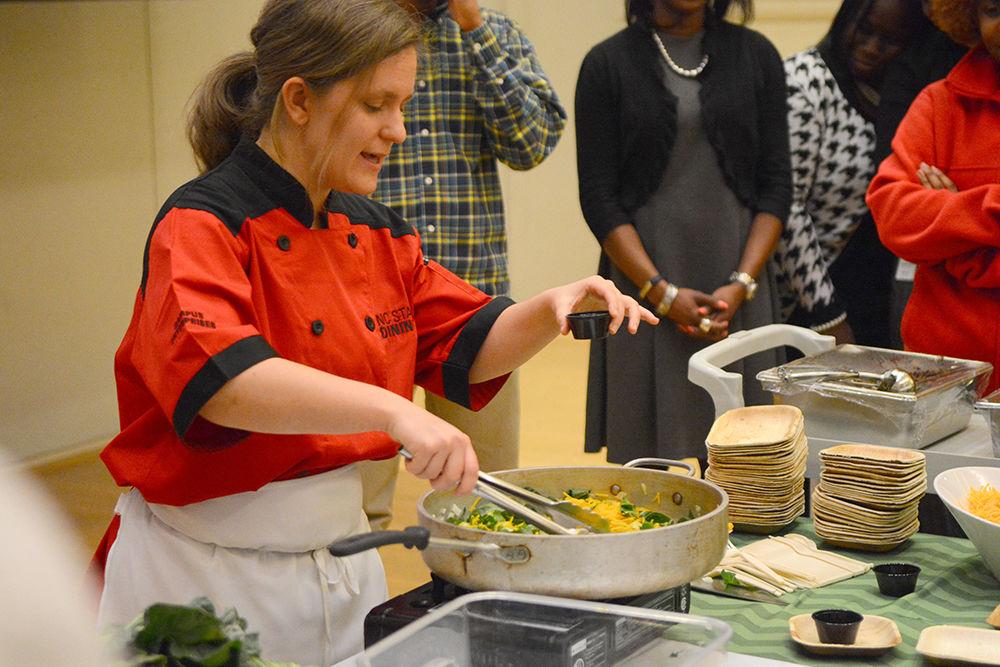A recent event celebrated the southern tradition of soul food while proposing ways to make the traditional African-American cuisine more healthful. A group of students gathered in Talley Student Union for “Food for the Soul,” a program featuring a presentation on the history and future of soul food and a cooking demonstration. Students sampled several soul food dishes that were reinvented to be more nutritious and less fattening.
Kelcy Walker, an assistant professor of public health at Saint Augustine’s University, opened the event with a lively presentation packed with statistics and humor. Audience members chimed in, laughed and nodded in hearty agreement as Walker presented information, commentary and suggestions. She explained the origins of soul food in the slave diet of the colonial period, and how those traditional foods have developed into an important aspect of African-American and southern culture, typically in church and family settings.
Walker also presented a series of sobering statistics that revealed that African-Americans are more likely to be overweight or obese and at higher risk for high blood pressure and diabetes.
“You can still hold true to the traditions, you can still respect and pay homage to those who came before you, but prepare food in a healthier way,” Walker said.
After Walker’s presentation, University Dining staff prepared several traditional soul foods with healthy twists, which the audience sampled with admiration. In fact, the food was a key component in encouraging attendance, as one student said.
“I thought, ‘Free food, why not?’” said John Pavlanksy, a freshman majoring in exploratory studies.
Additionally, all program participants went home with a copy of a recipe booklet sponsored by the American Heart Association. The booklet is packed with recipes for lighter versions of classics like smothered chicken, fried tomatoes, and mac and cheese.
The program represented a convergence of different groups in a few ways. The most apparent target audience was African-Americans, but students of all ethnicities were encouraged to attend; moreover, while the audience was predominantly African-American, it was by no means homogeneous. Additionally, the sponsoring organizations of the program and its goal were medleys.
“It’s a collaborative program, so each facet, whether it’s University Dining or wellness or Multicultural Affairs is bringing something completely different,” said William Rowe, a graduate student studying nutrition and a wellness assistant with University Recreation.
Each organization involved provided an aspect of the program, and the result was a single event that strove to honor African-American culture, not merely provide health advice.
“We just want to raise awareness, celebrate Black History Month and recognize that soul food is an important part of the culture … but also [that] it’s American Heart Month, and teach people how to make heart-healthy foods,” said Shannon DuPree, a wellness specialist with University Recreation.
This event provided a unique blend of historical information, contemporary health statistics, advice for practical application and tangible demonstrations of those practical application strategies. Together, with Walker’s ability to inform an audience in an engaging way and samples of delicious food provided by University Dining, “Food for the Soul” was a winning recipe.
Dr. Kelcey T. Walker presents information about the health risks of traditional "soul foods" at "Food for the Soul" in Talley Student Union's Piedmont Ballroom on Monday. Dr. Walker highlighted the disproportionate distribution of health issues, such as diabetes, among ethnic groups. Also addressed were the origins of "soul foods" in the "Black Belt", a term referencing the fertile soil of regions in the southern United States, and how the recipes can be transformed into healthier alternatives.








